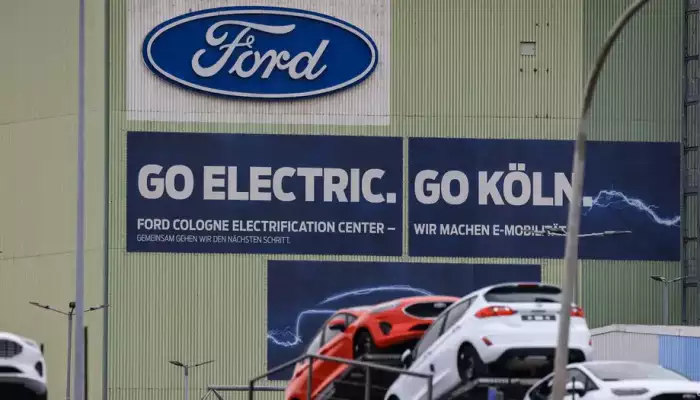Ford Announces Major Job Cuts in Europe Amid Shifting Automotive Landscape

Ford, one of the global’s biggest automakers, has announced a sweeping plan to cut about four,000 jobs across its European operations with the aid of the end of 2027. The business enterprise’s decision comes as it grapples with extensive losses in latest years, exacerbated by using the automobile enterprise’s ongoing shift toward electrified mobility, stricter CO2 emissions policies, and increasing competition from low-fee producers, specially in China.
This restructuring flow is anticipated to see 14% of Ford’s European staff laid off, with the largest percentage of process cuts anticipated to arise in Germany, where round 2,900 jobs might be eliminated. In addition to this, approximately 800 positions can be misplaced inside the United Kingdom, and 300 jobs will be slashed across different European Union nations. The cuts are a clean indication that Ford, like many different legacy automakers in Europe, is suffering to navigate the complex and competitive environment of present day automotive manufacturing.
Why Is Ford Cutting Jobs?
Ford’s European operations have been beneath stress for numerous years. In a statement, the company acknowledged the “sizable aggressive and financial headwinds” facing the location’s automotive sector, emphasizing the misalignment between CO2 rules and customer call for for electric powered vehicles (EVs). With the European Union imposing stringent new CO2 emission policies, automakers are required to ramp up the production and sale of electric powered cars. However, Ford is going through challenges on a couple of fronts, inclusive of:
- Struggling EV Sales: Despite developing pressure to supply greater electric powered motors, the agency is grappling with a lack of client demand for EVs in Europe. This is mainly regarding because the agency pivots to electrified mobility to fulfill stricter emissions requirements.
- Regulatory Pressure: Ford, like different Western automakers, faces the looming risk of massive fines if it fails to satisfy the European Union’s carbon emissions targets, set to go into effect subsequent yr. These policies are designed to force producers to promote greater zero-emissions vehicles, but many businesses, consisting of Ford, are nonetheless finding it difficult to provide low priced EVs that meet client expectations.
Three. Increased Competition: The entry of Chinese automakers into the European marketplace has intensified the competitive panorama. Chinese corporations are able to provide electric powered automobiles at considerably decrease costs, growing strain on Western automakers to conform speedy. Ford is also competing with set up European automakers, consisting of Volkswagen and BMW, which can be aggressively increasing their electric automobile offerings.
Four. Government Subsidy Reductions: In Germany, the most important vehicle marketplace in Europe, the government lately cut subsidies for electric cars in a bid to balance its national budget. Analysts record that this reduction has had a good sized impact on sales, with EV sales in Germany dropping by means of 28.6% for the duration of the first 9 months of 2023, in comparison to the equal length in 2022.
Impact on Ford’s Operations
Ford’s job cuts will have a profound effect on its Cologne plant in Germany, which currently employs around eleven,500 workers. The business enterprise has indicated that round one in 4 jobs on the Cologne facility may be eliminated. Furthermore, Ford may even lessen the operating hours of personnel at this plant. These cuts are anticipated to impact the production of certain fashions, specially the Capri and Explorer electric motors, which are manufactured on the Cologne website online.
The selection to reduce manufacturing on the Cologne plant displays the wider challenges Ford is facing in shifting its operations closer to electric powered mobility. The agency has now not been able to ramp up manufacturing fast enough to satisfy European customers’ developing expectations for cheap electric cars, and the opposition from lower-value manufacturers, specially in China, only adds to those problems.
Ford’s Response to Labor Unrest
Ford’s assertion of process cuts has raised concerns about hard work unrest and the capability for large protests. However, the organization has said that these layoffs will be completed in near consultation with exertions representatives and exchange unions. This suggests that Ford is attempting to mitigate the negative impact on people through undertaking discussions about the future course of the enterprise’s operations in Europe.
In addition to the job cuts at the Cologne plant, Ford has also announced plans to adjust operating hours for employees. While the corporation is not yet presenting precise details on which employees will be affected, the purpose is to ensure that the organization stays competitive in a rapidly changing automotive market. Despite these hard decisions, Ford has emphasized the significance of those changes to make certain the organisation’s future viability in Europe.
The Broader Challenges for the European Automotive Industry
Ford’s decision to reduce jobs is part of a wider trend visible among Western automakers suffering to regulate to a changing market. The complete automobile sector in Europe is undergoing a predominant transformation, with electric motors (EVs) turning into the focus. European policymakers have made it clean that the future of mobility can be electric powered, as evidenced via the ambitious goals set through the European Union’s Green Deal and the Fit for fifty five plan, which ambitions to cut emissions via 55% through 2030.
However, despite the rush for EVs, purchaser demand stays inconsistent. Many European customers are hesitant to make the transfer to electric cars because of concerns approximately range anxiety, charging infrastructure, and the better prematurely expenses of electric vehicles. Furthermore, international manufacturers from out of doors of Europe, in particular the ones based in China, are making inroads with less costly electric powered motors, adding additional pressure on Ford and its competitors to evolve quick to the marketplace’s desires.
The regulatory surroundings also provides a first-rate undertaking. The upcoming EU carbon emissions policies, which require automakers to lessen the common CO2 emissions of their fleets, threaten hefty fines for corporations that fail to fulfill goals. While Ford and different important automakers have made tremendous investments in electric vehicle improvement, the transition has been sluggish, and production ability for EVs remains now not on par with what’s going to be required to satisfy these regulatory cut-off dates.
At the equal time, opposition from Chinese automakers like BYD, NIO, and SAIC is intensifying. These agencies have fast grow to be leaders inside the worldwide electric powered car marketplace, imparting automobiles that are not only affordable however also aggressive in phrases of generation, layout, and variety. The influx of Chinese-made electric cars into Europe is disrupting the market, as those corporations are capable of provide automobiles at a lot decrease fees than traditional European producers can find the money for, forcing businesses like Ford to rethink their manufacturing strategies.
The Road Ahead for Ford
In response to those demanding situations, Ford has been implementing a transformation method to ensure its future competitiveness in Europe. This includes a widespread push toward electrification, value-slicing measures, and strategic partnerships. However, the path forward is unsure. Ford’s European operations continue to be below pressure, and it’s far clean that the organization will need to maintain making hard selections within the coming years to live afloat.
The process cuts in Europe are a clean indication that the transition to a more electric powered future isn’t with out its demanding situations. For people, these job cuts may also mark the start of a length of extensive uncertainty. For the automobile enterprise, Ford’s restructuring is yet any other reminder that the shift to electrification will no longer be smooth, and legacy automakers should adapt quick to survive in a unexpectedly changing market.
As Ford navigates those demanding situations, the future of electric cars in Europe will possibly retain to conform in approaches that could reshape the entire automobile panorama, forcing agencies to reconsider their strategies, operations, and even their group of workers fashions. The enterprise’s resilience will be examined, and the next few years can be vital in figuring out which businesses are high-quality positioned to thrive within the age of electrified mobility.


